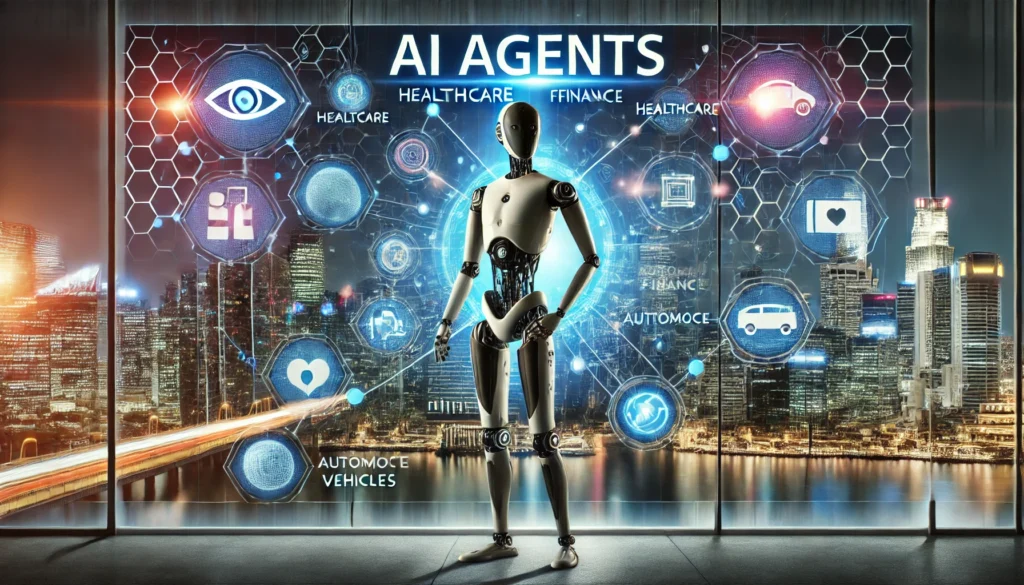
Artificial Intelligence (AI) agents are transforming how humans interact with technology. From virtual assistants like Siri and Alexa to self-driving cars and autonomous drones, AI agents are revolutionizing industries, boosting productivity, and pushing the boundaries of machine capabilities. In this guide, we’ll explore the definition of AI agents, their types, applications, challenges, and the exciting future ahead.
What Are AI Agents?
At their core, AI agents are autonomous software programs designed to perceive their environment, process data, and act toward achieving specific goals. These agents operate independently, learning from their surroundings and making decisions without constant human input.
Key Characteristics of AI Agents:
- Autonomy: Operate independently without user guidance.
- Perception: Sense and interpret environments through sensors or data inputs.
- Decision-Making: Analyze data and make informed choices.
- Learning: Improve over time using machine learning (ML) algorithms.
- Interaction: Communicate effectively with users or other systems.
Types of AI Agents
Understanding the different types of AI agents is crucial for identifying their potential applications:
1. Reactive Agents
Reactive agents respond to immediate stimuli without memory or learning. For instance, a thermostat adjusts the temperature based on real-time input.
2. Model-Based Agents
These agents use internal models to predict outcomes and make informed decisions, such as navigation apps predicting traffic conditions to suggest optimal routes.
3. Goal-Oriented Agents
Designed to achieve specific objectives, these agents use advanced algorithms to find the best path to success. Examples include industrial robotics.
4. Utility-Based Agents
These agents balance competing factors to deliver the best results. Self-driving cars, for instance, optimize for safety, speed, and efficiency.
5. Learning Agents
Powered by artificial intelligence and machine learning, these agents evolve over time by learning from data and user interactions. Examples include ChatGPT, recommendation systems, and personalized virtual assistants.
Applications of AI Agents
AI agents have widespread applications across industries:
1. Personal Assistance
Virtual assistants like Google Assistant, Siri, and Alexa handle tasks like scheduling, answering queries, and managing smart homes.
2. Healthcare
AI agents assist in diagnosing diseases, personalizing treatments, and even offering mental health support through chatbots.
3. Finance
From fraud detection to robo-advisors and automated customer service, AI agents streamline financial operations.
4. Autonomous Systems
AI powers autonomous vehicles, drones, and robotic systems, enabling real-time decision-making and navigation.
5. Gaming
In gaming, AI agents create immersive and dynamic experiences by adapting to player actions.
6. Education
AI tutors and learning platforms provide personalized education, tailoring content to individual needs.
7. Business Operations
From chatbots in customer support to AI-driven supply chain optimization, businesses leverage AI agents for efficiency.
The Technology Behind AI Agents
AI agents rely on cutting-edge technologies to function:
- Machine Learning (ML): Enables agents to learn from data and improve.
- Natural Language Processing (NLP): Powers communication by understanding and generating human language.
- Computer Vision: Helps agents analyze and interpret visual data.
- Reinforcement Learning: Trains agents to make decisions by rewarding positive outcomes.
- IoT Integration: Allows AI agents to interact with physical devices for real-world applications.
Challenges and Ethical Considerations
Despite their benefits, AI agents face challenges:
- Data Privacy: Protecting sensitive user data from breaches.
- Bias and Fairness: Ensuring unbiased and ethical decision-making.
- Transparency: Making AI decisions understandable and accountable.
- Autonomy Risks: Preventing unintended consequences of independent actions.
- Job Displacement: Addressing the impact of automation on employment.
The Future of AI Agents
The future of AI agents is brimming with possibilities:
- Enhanced Personalization: Hyper-tailored user experiences across industries.
- Human-Agent Collaboration: Seamless integration into workplaces to boost productivity.
- Emotional Intelligence: Agents capable of understanding and responding to human emotions.
- Advanced Automation: Fully autonomous systems in sectors like logistics, agriculture, and healthcare.
- Ethical Frameworks: Global standards ensuring responsible AI development and deployment.
Conclusion
AI agents are at the forefront of a technological revolution, reshaping industries and improving lives. By harnessing their potential responsibly, we can unlock a smarter, more efficient future.
Whether you’re a tech enthusiast, business leader, or curious learner, understanding AI agents is key to thriving in a world increasingly influenced by artificial intelligence.
Do you have thoughts or questions about AI agents? Share your insights in the comments below and join the conversation!
Leave a Reply